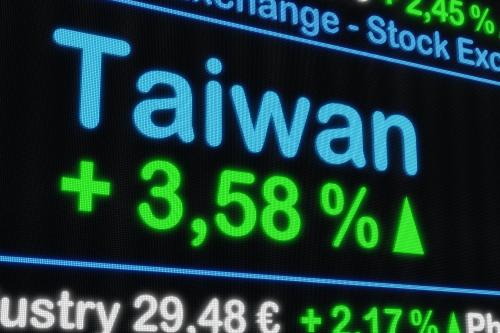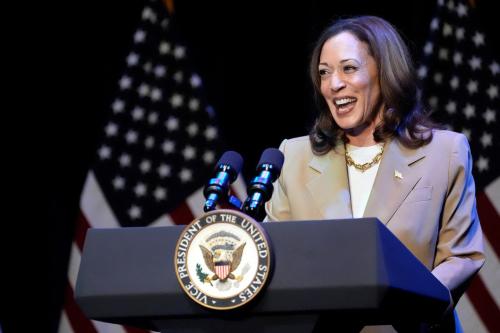This piece is part of the Taiwan-U.S. Quarterly Analysis series, which features the original writings of experts with the goal of providing a range of perspectives on developments relating to Taiwan.
No two places are perhaps more nervous about the results of the U.S. presidential election than Taiwan and South Korea, which are highly reliant on and have complex relations with the United States. In 2020, a YouGov poll showed that Taiwan was the only place in the Asia-Pacific that preferred Donald Trump to Joe Biden. Ever since then, the common wisdom in Washington and in Taipei has been that Taiwan still holds a preference for a Republican administration. Meanwhile in South Korea, a 2020 Gallup Poll showed strong support for Biden over Trump. Four years later, it is worth asking: how has support for Republican and Democratic administrations changed in Taiwan and South Korea?
Why does it matter to Americans how Taiwan and South Korea feel about American politics? Economically, Taiwan and South Korea play vital roles in the U.S. effort to restructure its semiconductor supply chain. Geopolitically, the United States needs strong, robust relations with its Asia-Pacific partners to maintain the region’s peace and stability. Knowing where the United States and its two political parties stand on these two vital, East Asian democracies is essential for policymakers in all three capitals.
In Taiwan’s context, the U.S.-Taiwan relationship has never been more critical. Taiwanese perceptions about the next U.S. president can impact both sides’ diplomatic efforts, and how Taiwanese see America could very well affect how likely Taiwanese are to defend their homes in the event of a Chinese invasion. Similarly, in the case of South Korea, the upcoming U.S. elections will play a critical role in the ever-changing alliance between Washington and Seoul. Moreover, South Korean attitudes toward the upcoming U.S. presidential election can also influence how South Koreans are likely to act in the event of a conflict with North Korea. While op-eds are penned claiming that America is in decline, how international audiences see America can speak much more directly to whether or not America is still a global leader.
In July 2024, one week prior to Biden dropping out of the race, we conducted two original surveys in Taiwan (n=1,500) and South Korea (n=1,008) to ask voters how they feel about the upcoming U.S. election. At the time of the survey, Biden was still the Democratic presidential candidate, and as such, we asked questions regarding support for Biden. Biden’s withdrawal from the race does not diminish our results. Rather, our findings offer important lessons for both parties and political observers going forward into the election. While we cannot extrapolate support for a new Democratic nominee based on support for Biden, our data speaks to how Taiwan and South Korea have comparatively seen the Trump and Biden administrations over the last eight years. How Taiwan and South Korea feel about these two administrations offers critical insight into how two of America’s closest partners in Asia believe the election’s outcome will impact their interests.
Biden was more popular than Trump
In both Taiwan and South Korea, Biden was more popular than Trump across all categories. For Taiwan watchers, this may come as a surprise, considering it has become common wisdom since the 2020 YouGov poll that Taiwanese voters prefer Trump. However, the last four years have led to a shift in Taiwanese support for Biden after they observed that the Democratic administration has continued to take a strong stance against China. This finding has held across party lines, with the majority of the Democratic Progressive Party and Kuomintang supporters preferring Biden to Trump. Only respondents from the Taiwan People’s Party were evenly split in their preference between Biden and Trump. South Koreans also prefer Biden over Trump by 26.8 percentage points, and this is consistent across political parties despite there being mixed support in the past.
The number of respondents in Taiwan who selected “I don’t know” is also a novel finding. The U.S. election has received constant attention in Taiwan across media platforms. It is unlikely that Taiwanese respondents do not know about the election or do not have an opinion on Trump or Biden. Instead, it is possible that many Taiwanese respondents genuinely do not know which candidate is better for Taiwan. Given the strong support for Taiwan across both the Trump and Biden administrations, both candidates could likely be seen as viable choices from Taiwan’s perspective. That said, Trump’s changing stance on Taiwan, like accusing TSMC of stealing the U.S. chip industry, can also make Taiwanese people nervous. Regardless of why Taiwanese respondents are more inclined to select “I don’t know,” we do not see overt Taiwanese support for Trump like we saw in 2020. In the case of South Korea, a large proportion of respondents responded with “no opinion,” indicating that the respondents, similar to those in Taiwan, have little opinion as to who would be a better president for the South Korean government to work with.
Beyond individual preferences, we also wanted to ask if respondents felt one candidate was better for their country, regardless of their own individual preferences. In both South Korea and Taiwan, Biden again maintained more support than Trump. In Taiwan, however, the number of respondents who responded with “I don’t know” or “no opinion” is equally high. This again indicates that Taiwanese respondents are somewhat ambivalent about the United States’ Democratic and Republican administrations. In the case of South Korea, a large majority seemed to believe that Biden would be the better candidate for their country.
Outside of their own country or region, we also asked which candidate respondents believed was better for global peace and security. Again, Biden was the clear preference over Trump. Many more Taiwanese than South Koreans, however, again expressed ambivalence between the two candidates. South Korean respondents exhibit far more overt enthusiasm for Biden than for Trump. Respondents’ perceptions of whether Trump or Biden is better for global security also closely mirror their responses for which candidate is better for their individual country. This indicates that respondents may be evaluating Trump’s and Biden’s global roles in the same way that they evaluate Trump’s and Biden’s relationships with their individual countries.
We are also interested in whether or not respondents believe that the next U.S. president matters for their most serious issue: conflict with China and North Korea, respectively. A majority of South Koreans (71.4%) and Taiwanese (54.7%) believe that the United States will defend their nation regardless of who the next president is, although Taiwanese feel this way by only a small margin. The opinion is more divided in Taiwan as to whether the United States would come to Taiwan’s aid should there be a conflict.
While perceptions of whether America will defend Taiwan or South Korea in the event of a conflict are worthy of a separate discussion, the fact that who the U.S. president is does not affect perceptions of support is perhaps an important silver lining to our survey results. Even though there is concern over America’s commitment to both Taiwan and South Korea, both places can sense a level of consistency across party lines when it comes to how the United States will act.
Is America seen positively?
Next, we asked a series of questions on whether the United States is seen as a trustworthy ally. Here, we find a clear divergence between South Korean and Taiwanese respondents. South Korea has more positive impressions of America, and South Korean respondents view the United States to be much more trustworthy than respondents in Taiwan. Our findings are consistent with other political science research that has asked Taiwanese voters about their perceptions of the United States and found similarly low levels of trust.
Why do Taiwanese voters feel so strongly that America will help them in the event of war, but still feel that the United States is not trustworthy? Future research is needed to better understand this juxtaposition, as it has major implications for both Taiwan’s domestic politics and U.S.-Taiwan relations.
Did the assassination attempt change perceptions of Trump and Biden in South Korea?
Our survey in South Korea was in the middle of being fielded when Trump was injured during an assassination attempt. This meant that some of our respondents took the survey before (765 respondents) and after (243 respondents) the event occurred. We were able to measure if there was any meaningful difference in responses of support for Trump or Biden among South Korean respondents following the event and whether Trump’s defiant image in the aftermath influenced support.
While support for Trump did increase by over 6% after the assassination attempt, support for Biden dropped by more than 10% following the event. This is particularly surprising, given the otherwise strong expression of support for Biden in South Korea. It also varies from the existing polling data that suggested there was no major change in Americans’ support for Trump or Biden following the assassination attempt.
Conclusion
Do Taiwan and South Korea prefer a Democratic or Republican administration? Our results show that respondents in both places preferred Biden’s administration to Trump’s. However, the high number of ambivalent responses, especially in Taiwan, also suggests a relatively high level of acceptance for both parties. Our future survey work will ask about respondents’ support for the future Democratic ticket and will be able to speak comparatively not just between democrats and republicans, but if there is a meaningful difference in how Taiwan and South Korea see Biden versus his replacement. While support for both parties is likely to fluctuate over the next four months, the clear and consistent response that Biden was believed to be the better choice individually, nationally, and globally is clear enough to offer important insight for Washington, Taipei, and Seoul.









Commentary
How Taiwan and South Korea see Democrats, Republicans, and America
July 30, 2024